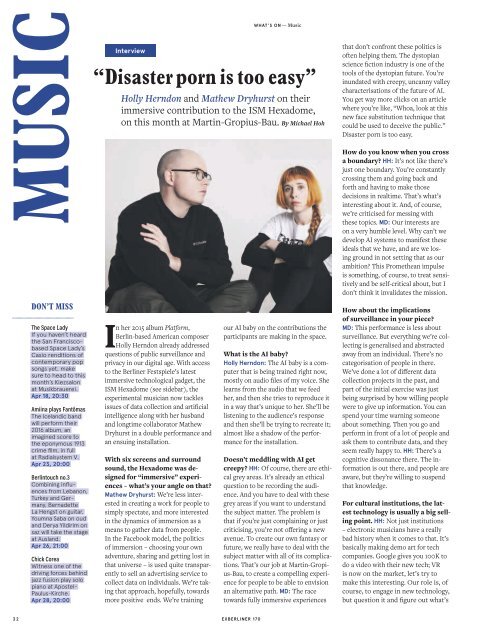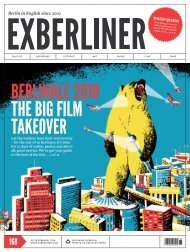EXBERLINER Issue 170, April 2018
Create successful ePaper yourself
Turn your PDF publications into a flip-book with our unique Google optimized e-Paper software.
WHAT’S ON — Music<br />
Interview<br />
“Disaster porn is too easy”<br />
Holly Herndon and Mathew Dryhurst on their<br />
immersive contribution to the ISM Hexadome,<br />
on this month at Martin-Gropius-Bau. By Michael Hoh<br />
that don’t confront these politics is<br />
often helping them. The dystopian<br />
science fiction industry is one of the<br />
tools of the dystopian future. You’re<br />
inundated with creepy, uncanny valley<br />
characterisations of the future of AI.<br />
You get way more clicks on an article<br />
where you’re like, “Whoa, look at this<br />
new face substitution technique that<br />
could be used to deceive the public.”<br />
Disaster porn is too easy.<br />
How do you know when you cross<br />
a boundary? HH: It’s not like there’s<br />
just one boundary. You’re constantly<br />
crossing them and going back and<br />
forth and having to make those<br />
decisions in realtime. That’s what’s<br />
interesting about it. And, of course,<br />
we’re criticised for messing with<br />
these topics. MD: Our interests are<br />
on a very humble level. Why can’t we<br />
develop AI systems to manifest these<br />
ideals that we have, and are we losing<br />
ground in not setting that as our<br />
ambition? This Promethean impulse<br />
is something, of course, to treat sensitively<br />
and be self-critical about, but I<br />
don’t think it invalidates the mission.<br />
DON’T MISS<br />
The Space Lady<br />
If you haven’t heard<br />
the San Franciscobased<br />
Space Lady’s<br />
Casio renditions of<br />
contemporary pop<br />
songs yet, make<br />
sure to head to this<br />
month’s Kiezsalon<br />
at Musikbrauerei.<br />
Apr 18, 20:30<br />
Amiina plays Fantômas<br />
The Icelandic band<br />
will perform their<br />
2016 album, an<br />
imagined score to<br />
the eponymous 1913<br />
crime film, in full<br />
at Radialsystem V.<br />
Apr 23, 20:00<br />
Berlintouch no.3<br />
Combining influences<br />
from Lebanon,<br />
Turkey and Germany,<br />
Bernadette<br />
La Hengst on guitar,<br />
Youmna Saba on oud<br />
and Derya Yildirim on<br />
saz will take the stage<br />
at Ausland.<br />
Apr 26, 21:00<br />
Chick Corea<br />
Witness one of the<br />
driving forces behind<br />
jazz fusion play solo<br />
piano at Apostel-<br />
Paulus-Kirche.<br />
Apr 28, 20:00<br />
In her 2015 album Platform,<br />
Berlin-based American composer<br />
Holly Herndon already addressed<br />
questions of public surveillance and<br />
privacy in our digital age. With access<br />
to the Berliner Festspiele’s latest<br />
immersive technological gadget, the<br />
ISM Hexadome (see sidebar), the<br />
experimental musician now tackles<br />
issues of data collection and artificial<br />
intelligence along with her husband<br />
and longtime collaborator Mathew<br />
Dryhurst in a double performance and<br />
an ensuing installation.<br />
With six screens and surround<br />
sound, the Hexadome was designed<br />
for “immersive” experiences<br />
– what’s your angle on that?<br />
Mathew Dryhurst: We’re less interested<br />
in creating a work for people to<br />
simply spectate, and more interested<br />
in the dynamics of immersion as a<br />
means to gather data from people.<br />
In the Facebook model, the politics<br />
of immersion – choosing your own<br />
adventure, sharing and getting lost in<br />
that universe – is used quite transparently<br />
to sell an advertising service to<br />
collect data on individuals. We’re taking<br />
that approach, hopefully, towards<br />
more positive ends. We’re training<br />
our AI baby on the contributions the<br />
participants are making in the space.<br />
What is the AI baby?<br />
Holly Herndon: The AI baby is a computer<br />
that is being trained right now,<br />
mostly on audio files of my voice. She<br />
learns from the audio that we feed<br />
her, and then she tries to reproduce it<br />
in a way that’s unique to her. She’ll be<br />
listening to the audience’s response<br />
and then she’ll be trying to recreate it;<br />
almost like a shadow of the performance<br />
for the installation.<br />
Doesn’t meddling with AI get<br />
creepy? HH: Of course, there are ethical<br />
grey areas. It’s already an ethical<br />
question to be recording the audience.<br />
And you have to deal with these<br />
grey areas if you want to understand<br />
the subject matter. The problem is<br />
that if you’re just complaining or just<br />
criticising, you’re not offering a new<br />
avenue. To create our own fantasy or<br />
future, we really have to deal with the<br />
subject matter with all of its complications.<br />
That’s our job at Martin-Gropius-Bau,<br />
to create a compelling experience<br />
for people to be able to envision<br />
an alternative path. MD: The race<br />
towards fully immersive experiences<br />
How about the implications<br />
of surveillance in your piece?<br />
MD: This performance is less about<br />
surveillance. But everything we’re collecting<br />
is generalised and abstracted<br />
away from an individual. There’s no<br />
categorisation of people in there.<br />
We’ve done a lot of different data<br />
collection projects in the past, and<br />
part of the initial exercise was just<br />
being surprised by how willing people<br />
were to give up information. You can<br />
spend your time warning someone<br />
about something. Then you go and<br />
perform in front of a lot of people and<br />
ask them to contribute data, and they<br />
seem really happy to. HH: There’s a<br />
cognitive dissonance there. The information<br />
is out there, and people are<br />
aware, but they’re willing to suspend<br />
that knowledge.<br />
For cultural institutions, the latest<br />
technology is usually a big selling<br />
point. HH: Not just institutions<br />
– electronic musicians have a really<br />
bad history when it comes to that. It’s<br />
basically making demo art for tech<br />
companies. Google gives you 100K to<br />
do a video with their new tech; VR<br />
is now on the market, let’s try to<br />
make this interesting. Our role is, of<br />
course, to engage in new technology,<br />
but question it and figure out what’s<br />
32 <strong>EXBERLINER</strong> <strong>170</strong>

















